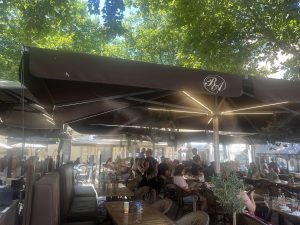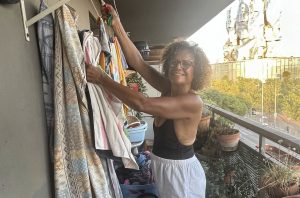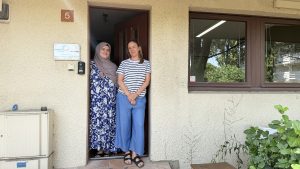
Photo by Jessie Shaw.
Text by Jessie Shaw
Photos by Jessie Shaw and Griselda Garcia
In the last two weeks of June 2025, Arles sizzled in the extreme heat. Numerous citizens hosed down the streets and sprayed water from squirt guns to keep others cool when the temperature reached past 100 degrees Fahrenheit in the afternoon. Several children and teachers fainted in local schools.
Faced with one of the worst heat waves in modern history, Arles put into place new systems to protect its residents.
According to Agnès Pannier-Runacher, the minister of ecological transition, June 2025 was the second hottest June in France since 1900, trailing behind June 2003. Pannier-Runacher said that at least two people died from heat-related illnesses as a result of the unprecedented heat in France.
Among the problems France faces regarding heatwave preparation is the lack of air conditioning in most homes; only 25% of French households are equipped with air conditioning. The lack of air conditioning in homes has prompted French far-right politicians to advocate for universal access to air conditioning in public spaces and households. Marine Le Pen expressed her desire to implement a “grand air conditioning plan” if she wins the April 2027 presidential election.
In Arles, one of the cities most affected by the heat, the Centre communal d’action social (County Care Center) issued an orange warning for extreme heat during the week of the heat wave. The CCAS is a city-run institution established in 1986 to support the most vulnerable groups of people, primarily children, the elderly, the homeless, and people with physical or mental disabilities. It is divided into three branches: the Early Childhood Center, the Social Services and Support Center, and the Senior Center. During heat waves, the CCAS provides information about public spaces with air conditioning for sensitive groups.
Céline Niderlender, the head of the Social Services and Support Center of the CCAS, explained that both Arles and the rest of France have become more prepared to prevent heat-related deaths since the 2003 European heatwave, with the establishment of prevention plans to help the most vulnerable groups.
“In 2003, there was that severe heatwave with many deaths,” Niderlender explained. “Since then, France has become very well organized on this issue. We now have pre-established prevention plans, and we make specific proposals for seniors. For example, in the city, there are several senior clubs: one in the city center, one in each priority neighborhood, and one at Mas-Thibert. These are open all day to welcome not only regular senior visitors but also any seniors who don’t have a way to cool down at home.”
Furthermore, Niderlender’s team has distributed water to the elderly and the homeless every day all year round.
“For the elderly, and also from a social perspective — whether during yellow or orange alerts — we organize outreach patrols,” Niderlender said. “That means every day, we have staff who go out for about three hours to distribute water.”
Niderlender’s team also reaches out to unhoused people during heat waves.
“We visit them, give them important advice, especially because there’s a lot of alcohol consumption, and alcohol dehydrates the body,” Niderlender explained. “So we check in to see if people are doing okay. Sometimes we even need to call emergency services.”
The recent heat wave in late June and early July particularly affected Arles’s schools.
Lily Jouchoux, a parent representative for her children’s school, École élémentaire Amédée Pichot, had to pick up her son from school after he threw up due to the extreme heat.
“Children are sick, and teachers too,” Jouchoux said. “We don’t have anything to [provide shade] … no curtains, not so many trees in the yard, and no fans or air conditioning.”
According to Jouchoux, it was the first time her son’s school had to close due to extreme heat.
“In Arles, there are just two schools with AC,” Jouchoux said. “So they proposed to put our children in one of the schools, but it was full.”
Jouchoux has gathered numerous parents angry about the lack of cooling systems in the classrooms and plans to petition the mayor to at least insulate the school building or provide trees in the schoolyard.
“AC is not the only solution,” Jouchoux said. “They should [insulate] the building and put in trees. It’s a long-term vision, but they have to begin now.”
Frédéric Imbert, the 7th deputy mayor of Arles, understood the grievances expressed by parents and teachers and advocated for better conditions for the schools. However, Imbert admitted that improving the school conditions for heat waves would be extremely expensive and would take a long time to complete.
“We are the biggest town in the country [geographically speaking],” Imbert explained. “We need lots of means, financial and otherwise, in order to meet the needs of all of the territory. But only 35% of the population actually pays taxes, so those means are very low [while] the charges are very high.”
Given that most schools in Arles lack air conditioning or fans, City Hall sent all of its portable AC units to the schools so students and teachers could wrap up the school year, which ended on July 4, on time.
According to Imbert, renovating Arles’s schools to include air conditioning would cost 30 million euros, which would be impossible to achieve in a short period. However, Imbert believes that other considerations can be taken to ensure the safety of the students and teachers.
“We must start insulating the buildings [and shade] the areas in front of the schools, and maybe change the hours of the school when the weather is like that,” Imbert said. “Maybe change the school times when the weather is this hot, [such as] starting [the school year] earlier and ending earlier.”
With climate change, Arles will likely endure hotter summer temperatures and an increased need for such preparations.






